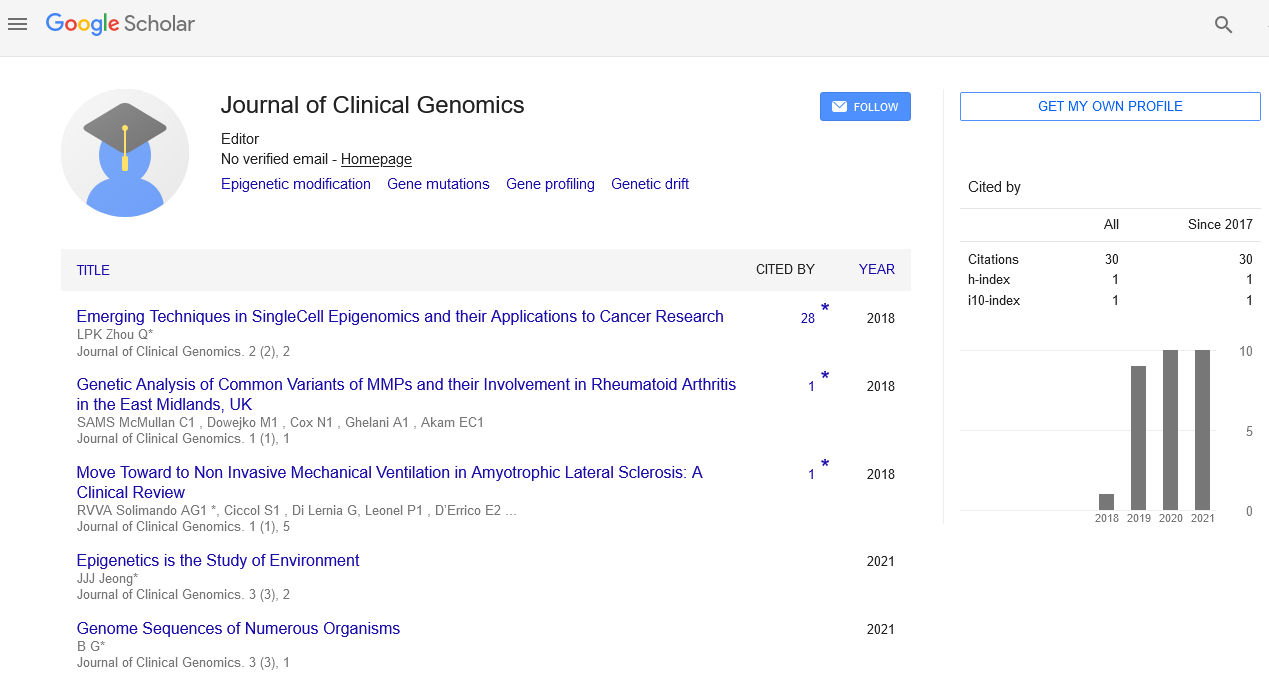Perspective, J Clin Genom Vol: 3 Issue: 3
Epigenetics is the Study of Environment
Jaeseung Jeong*
Department of Bio and Brain Engineering, Korea Advanced Institute of Science and Technology, South Korea
*Corresponding author: Dr. Jaeseung Jeong, Department sof Bio and Brain Engineering, Korea Advanced Institute of Science and Technology, South Korea , E-mail: : jsjeong@kaist.ac.kr
Received date: 04 June, 2021; Accepted date: 19 June, 2021; Published date: 28 June, 2021
Keywords: Histones
Introduction
The development and maintenance of a multicellular organism is orchestrated by a set of chemical reactions that switch parts of the genome off and on at strategic times and locations. The cells in a multicellular organism have nominally identical DNA sequences (and therefore the same genetic instruction sets), yet maintain different terminal phenotypes. Genetic mechanisms alone cannot explain how these cellular traits are propagated. This non-genetic cellular memory, which records developmental and environmental cues (and alternative cell states in unicellular organisms), is the basis of epi-(above)– genetics. A cells epigenetic landscape is governed by "chromatin" which is a complex of DNA and all its associated proteins including histones. The lack of identified genetic determinants that fully explain the heritability of complex traits, and the inability to pinpoint causative genetic effects in some complex diseases, suggest possible epigenetic explanations for this missing information. Epigenetic programs play a crucial role in many biological processes including embryonic development and cellular differentiation. For example, the genome of pluripotent cells is generally highly methylated while the process of differentiation is associated with a loss of DNA-methylation marks. Additionally, pluripotent cells generally have a greater incidence of chromatin in an open state, which is determined by specific histone modifications, while differentiated cells are more enriched in condensed chromatin. Epigenetic mechanisms have been also recently recognized to regulate autophagy, a homeostatic process controlling cellular components. Abnormal frequency or location of epigenetic marks, often due to the aberrant function of DNA- or histonemodifying enzymes, has been associated with various disease states including cancer and neurodegeneration. For example, hypermethylation of tumor-suppressor genes has been identified as a pro-tumorigenic aberrant epigenetic mechanism. In the first of his videos, Dr. Allis introduces the concept of epigenetics; a change in a cellular phenotype that is not due to DNA mutation but due to chemical modifications of proteins that result in changes in gene activation. In the nucleus, DNA is wrapped around proteins called histones to form chromatin. How tightly the chromatin is packaged determines whether genes are active or not. This switch between the “on and off” state of chromatin is regulated by chemical modification of histones. Allis describes work from his lab and others that identified the enzymes that add, remove and recognize the histone modifications. Changes in histone modification can cause a number of diseases including cancer. A key difference between genetic mutations and epigenetic modifications is that epigenetic changes are reversible making them an attractive drug target. When a cell divides, the ‘parent’ cell’s epigenetic state can be maintained in the daughter cells. This means that a trigger at one point in time can influence how a cell behaves at a later time. It also means that when a certain type of cell divides it produces another cell of the same type. Thus, a liver cell divides into two liver cells, not into any other type of cell. Epigenetics refers to functionally relevant changes to the genome that do not involve changes in DNA sequence. Epigenetic switches occur in normal biological or disease processes or as a consequence of diet and other external environmental factors; and they induce changes in gene and protein expression. The form and function of every cell in the human body is determined by the genes and proteins it expresses and also by the signals it receives from the surrounding cells. Regulation of gene transcription and translation are therefore key biological determinants for cellular differentiation and function, and transcriptional imbalances play a significant role in a number of human diseases. Epigenetics is the study of how the environment and other factors can change the way that genes are expressed. While epigenetic changes do not alter the sequence of a person's genetic code, they can play an important role in development. Scientists who work in epigenetics explore the mechanisms that affect the activity of genes. All human characteristics, including psychological ones, are influenced to some extent by genetics. Since the epigenome modulates the effects of an individual's genome—and because it can be influenced by external factors—it is naturally a major area of exploration for those seeking to understand how individual differences, mental illness and other aspects of cognitive life take shape.
 Spanish
Spanish  Chinese
Chinese  Russian
Russian  German
German  French
French  Japanese
Japanese  Portuguese
Portuguese  Hindi
Hindi 